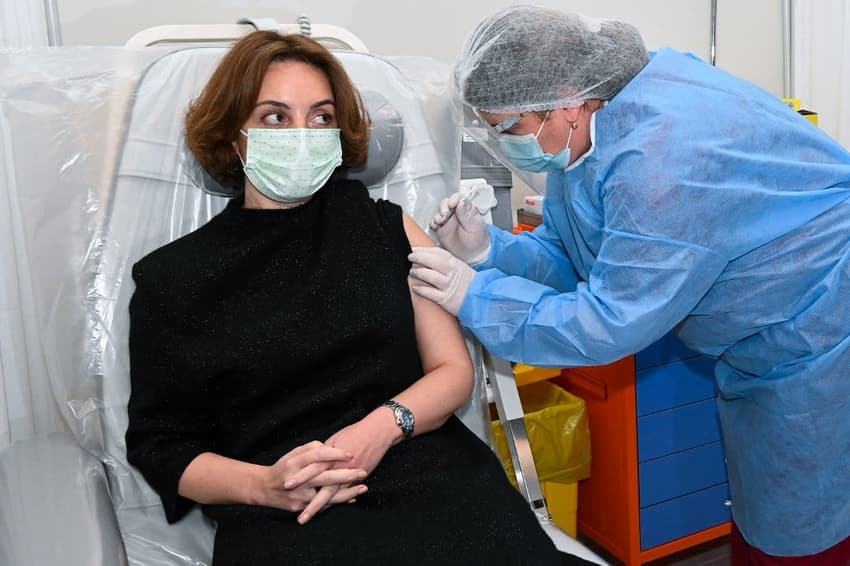Austria to 'continue to give AstraZeneca to under 60s'

The head of Austria’s vaccination committee has pledged to keep using AstraZeneca vaccines for under 60s, despite Germany’s decision to stop using the vaccine for this group
Professor Ursula Wiedermann-Schmid, who heads up Austria's vaccination authority, gave an interview to the ZIB2 programme on Tuesday evening - just hours after Germany had suspended vaccinations for people under 60.
She said while it was “worrying” that the vaccine could trigger “very rare” but dramatic events in individual cases, the third wave of coronavirus infections in Austria was increasingly affecting younger people.
She said it was important to look at the whole situation and ensure the benefits outweigh any risk. There are too few alternative vaccines to stop using AstraZeneca, she said.
READ MORE: Germany cannot ignore AstraZeneca’s findings, says Merkel
Wiedermann-Schmidt pointed out vaccinations led to one or two relevant incidents per 100,000 vaccinations, but it was not clear this was only linked to the AstraZeneca vaccine.
On the other hand, there are four to six corona deaths per week among people under the age of 55 from coronavirus throughout Austria.
She said patients and doctors should be informed about the risk, allowing action as soon as possible if symptoms occur.
What are the symptoms of thrombosis?
According to Wiedermann-Schmidt, “typical symptoms” of thrombosis following vaccination often occur after four to ten days.
These include nausea, sudden fever, renewed headache and a stomach ache.
‘Very low risk’
According to the Austrian Federal Office for Safety in Health Care (BASG), a causal connection with the vaccination and thrombosis registered in Europe can neither be proved or yet be ruled out with certainty.
According to the authority, women under 55 years of age have a very low risk (less than one in 100,000) for a rare form of coagulation disorders with blood clots after vaccination against Covid-19, which should be pointed out before vaccination, the Wiener Zeitung newspaper reports.
READ MORE: Austria to continue using AstraZeneca vaccine
Wiedermann-Schmidt considers it "very likely" that vaccination against the coronavirus causes damage to blood platelets which can then lead to a blood clot.
However, it is still unclear whether only AstraZeneca vaccines have this side effect, she said.
Comments
See Also
Professor Ursula Wiedermann-Schmid, who heads up Austria's vaccination authority, gave an interview to the ZIB2 programme on Tuesday evening - just hours after Germany had suspended vaccinations for people under 60.
She said while it was “worrying” that the vaccine could trigger “very rare” but dramatic events in individual cases, the third wave of coronavirus infections in Austria was increasingly affecting younger people.
She said it was important to look at the whole situation and ensure the benefits outweigh any risk. There are too few alternative vaccines to stop using AstraZeneca, she said.
READ MORE: Germany cannot ignore AstraZeneca’s findings, says Merkel
Wiedermann-Schmidt pointed out vaccinations led to one or two relevant incidents per 100,000 vaccinations, but it was not clear this was only linked to the AstraZeneca vaccine.
On the other hand, there are four to six corona deaths per week among people under the age of 55 from coronavirus throughout Austria.
She said patients and doctors should be informed about the risk, allowing action as soon as possible if symptoms occur.
What are the symptoms of thrombosis?
According to Wiedermann-Schmidt, “typical symptoms” of thrombosis following vaccination often occur after four to ten days.
These include nausea, sudden fever, renewed headache and a stomach ache.
‘Very low risk’
According to the Austrian Federal Office for Safety in Health Care (BASG), a causal connection with the vaccination and thrombosis registered in Europe can neither be proved or yet be ruled out with certainty.
According to the authority, women under 55 years of age have a very low risk (less than one in 100,000) for a rare form of coagulation disorders with blood clots after vaccination against Covid-19, which should be pointed out before vaccination, the Wiener Zeitung newspaper reports.
READ MORE: Austria to continue using AstraZeneca vaccine
Wiedermann-Schmidt considers it "very likely" that vaccination against the coronavirus causes damage to blood platelets which can then lead to a blood clot.
However, it is still unclear whether only AstraZeneca vaccines have this side effect, she said.
Join the conversation in our comments section below. Share your own views and experience and if you have a question or suggestion for our journalists then email us at [email protected].
Please keep comments civil, constructive and on topic – and make sure to read our terms of use before getting involved.
Please log in here to leave a comment.